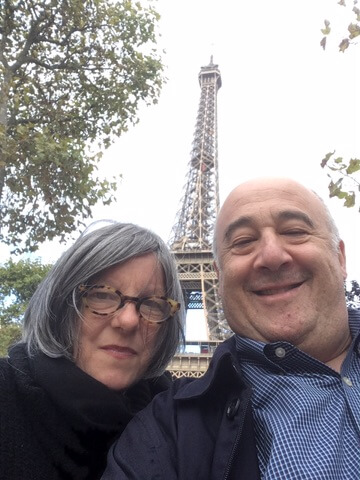Husband and wife Ken Deutsch and Amy Green like to say they’re now “chasing the tail” of the bell curve. They have each had to grapple with cancer, as well as multiple setbacks and even recurrences.
However, thanks to the care they’ve received at Dana-Farber — along with the support they’ve had from each other — both are still doing well years out from their original diagnoses.
“It’s not an accident we’re both still here,” Green says. “Dana-Farber saved our lives.”

A cancer diagnosis, then another challenge
In 2014, Deutsch started noticing blood in his urine. Concerned, he reached out to a urologist who was able to quickly diagnose him with stage I bladder cancer. Deutsch, then 52, was stunned by the news but remained optimistic: Early-stage bladder cancer is highly treatable.
Deutsch underwent two surgeries to remove bladder tumors (a procedure known as TURBT) and was scheduled for a third later that year. But he never underwent the third procedure: Doctors instead discovered that Deutsch’s cancer had quickly metastasized to his spine.
“My whole mindset changed that day, and I got myself ready to take this on,” says Deutsch. “Your attitude helps you cope, and I have an amazing partner in Amy.”
Immediately, Deutsch was referred to Dana-Farber/Brigham and Women’s Cancer Center, specifically the Institute’s Lank Center for Genitourinary Oncology. Today, his care is led by Guru Sonpavde, MD, director of the center’s bladder cancer department.
Targeted approach
In November 2014, Deutsch’s treatments began. He underwent chemotherapy followed by radiation therapy. Since then, he has experienced three recurrences of cancer: twice in his brain (in 2016 and 2018) and once in his lungs (in 2017). He had surgery following each cancer recurrence to remove the new cancer cells, and in the instances it was discovered in his brain, he also received stereotactic radiosurgery (SRS). This type of surgery delivers high-dose radiation to a specific region of the brain.
“For a long time, I didn’t let myself look towards the future, but instead focused on getting through this year or month,” says Deutsch. “I’ve been lucky. I’ve been there for birthdays, my son’s high school graduation and most recently seeing him off to college.”
Deutsch underwent his final round of SRS in 2018, and today, he is not showing any new evidence of disease, nor is he on any treatment.

A role reversal
In March 2017, Deutsch was doing well, and his family was optimistic that they would get past this challenge. That was until Green discovered a lump in her right breast, and the family’s future was once again thrown into uncertainty.
The lump was cancerous, although it was not breast cancer. Green was diagnosed with extensive small cell carcinoma. (It is incredibly rare for a breast lump to be an indication of small cell carcinoma. In fact, most breast lumps are benign.) After additional scans, doctors found other sites of metastases.
Green started to focus on her treatment and says there was only one place she ever considered going: Dana-Farber.
“I had a lot of faith in my care team having witnessed the level of quality care and compassion Ken received,” says Green.
Green was paired with Joe Jacobson, MD, a senior physician in the Lowe Center for Thoracic Oncology at Dana-Farber, and on Green’s request, the two put together an aggressive treatment plan.
Green underwent both chemotherapy and radiation, as well as surgery when possible, and repeated many of these steps when she faced relapses in 2018 and 2019. Today, Green is not on any treatment, and has enjoyed cancer free scans for over a year.
“She’s been incredibly strong and inspiring throughout this,” Deutsch explains.
Moving forward
Since Green’s original diagnosis, she and Deutsch have switched off as patient and caregiver. While the pair have dealt with their diseases differently (Green has been relatively private and ignores the statistics, while Deutsch is the opposite), they agree it’s been immensely important to have each other both for support and inspiration.
“The way Ken handled his diagnosis and his ability to stay positive really helped me during my diagnosis,” says Green. “We each have our strong support systems, but we’re also fortunate that we have one another.”
Both Deutsch and Green are back at work full time, Deutsch as the head of research and insights at a health communications agency, and Green as a political writing consultant. As a result of the COVID-19 pandemic, they’re also sharing office space with their son, Bedilu, who is a freshman at the Savanah College of Art and Design.
For Deutsch, who focuses on getting to each milestone, he says the next one is easy: he wants to be at the Academy Awards after his son is nominated for directing.
